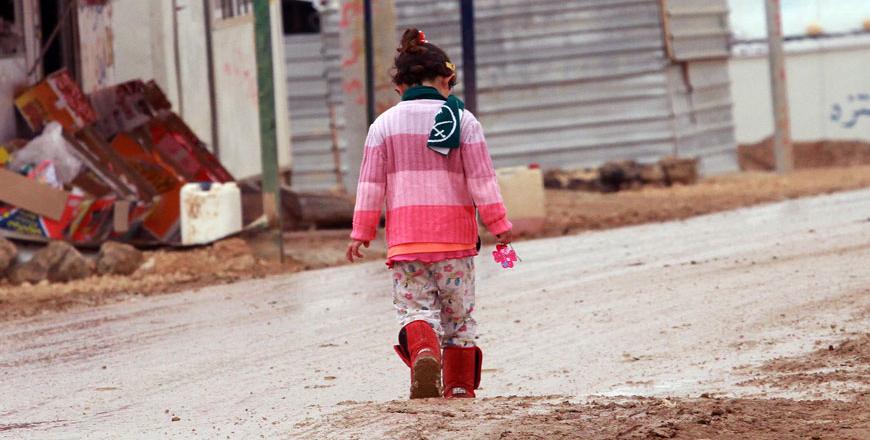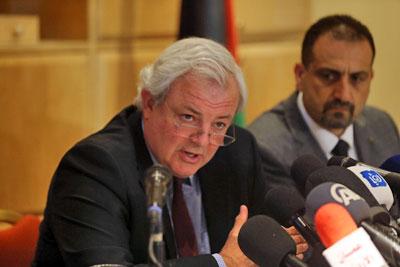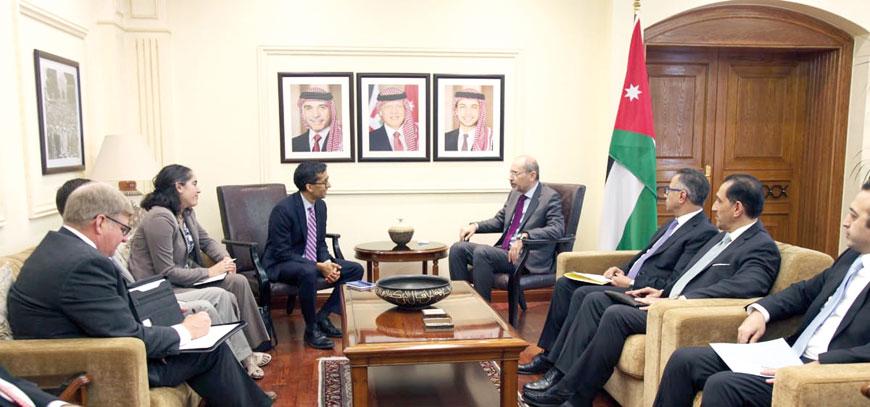You are here
Plight of Syrians stranded on border exposes world’s ‘helplessness’
By Mohammad Ghazal - Jan 21,2016 - Last updated at Jan 21,2016

A Syrian refugee walks in the Zaatari Refugee Camp on Wednesday. The camp is home to 79,357 refugees, according to the UNHCR's latest estimates (Photo by Hassan Tamimi)
AMMAN — Jordan’s ongoing efforts to help the endless flow of Syrian refugees once more come under the limelight as the focus shifts to around 16,000 of haven seekers stranded in the no man’s zone with Syria.
The “desperate” situation of these refugees facing severe conditions a few hundred metres north of the border exposes the international community’s helplessness as well as the immense burdens shouldered by Jordan, whose resources have been stretched too thin by the refugee crisis, according to analysts.
A UN relief worker said the “miserable” situation of these refugees, who arrived from areas under the control of Daesh terror group, requires speedy action by the world community.
The UN worker, who spoke on condition of anonymity, warned that these refugees now live in dire conditions in the open in temperatures dropping to below zero at night, “which have claimed the lives of some”, especially the vulnerable.
“The situation could get even worse with colder freezing temperatures forecast for next week.”
Expressing understanding of Jordan’s inability to allow in all refugees arriving from its much larger, war-torn northern neighbour, the worker, who was helping distribute aid to the stranded refugees, said the international community should shoulder its responsibility in helping them.
Jordan, which is already delivering relief aid to these refugees, has offered to help any third-party countries willing to offer shelter to them.
On Monday, Minister of State for Media Affairs and Communications and Government Spokesperson Mohammad Momani said that there are around 16,000 Syrians in camps situated a few hundred metres from the Jordanian side in the “no man’s land”, fleeing danger zones in northern and eastern Syria that are “in fact closer to other neighbouring countries than to Jordan”.
“Jordan is willing to cooperate with any country that might be able to take refugees from the border camp,” the minister stressed, adding that the Syrians in these camps are being provided with their needs of supplies, tents and medications through Jordan, provided by Jordan-based UN agencies, as well as the Jordan Armed Forces-Arab Army (JAF) and other donors.
The Kingdom, which currently hosts some 1.3 million Syrians on its territory, or the equivalent of 20 per cent of its population, is facing “serious security, economic and social challenges”, according to experts, who referred to recent concerns raised by His Majesty King Abdullah during a recent interview with CNN.
Fayez Dweiri, a retired major general in the Jordanian army and a military analyst, said Jordan needs to heavily focus on security issues, especially after receiving information that there are Daesh sympathisers amongst those Syrians at the borders.
“Terrorism has become trans-boundary. We have seen bombings in Turkey, Indonesia, Lebanon, Paris and several attacks elsewhere. Therefore, Jordan has all the right to protect its sovereignty and society from any possible imminent threat,” said Dweiri.
“It is the international community to blame for its double standards as its stands regarding burdens shouldered by Jordan are disgraceful and unacceptable…Jordan cannot tolerate any security breach, especially since it is aware that there are Daesh sympathisers amongst those…The humanitarian aspect should not transcend the security aspect in this regard,” warned the military analyst.
In addition to these security concerns, economic challenges should also be taken into account.
With a public debt of JD22.5 billion at present, a growing unemployment rate, a rise in living costs and an estimated budget deficit of more than JD1.2 billion in 2016 coupled with growing security spending, Jordan is in a “very tough situation” and the international community’s aid to Jordan is far from being enough, economist Hosam Ayesh told The Jordan Times on Wednesday.
“In November, the EU approved extending 3 billion euros to Turkey, which is one of the largest economies in the world, to lower the chaotic flood of Syrian asylum seekers into Europe... But when it comes to Jordan, one of the smallest economies in the region that faces serious challenges, the international community’s aid has been falling short of the actual needs over the past years,” said the economist.
Jordan appealed for $2.99 billion for interventions to help the Syrian refugees and host communities in 2015, but received 35 per cent of the appeal, according to figures from the Ministry of Planning and International Cooperation.
In late 2015, Jordan appealed for $7.99 billion in financing from the international community to its 2016-2018 Jordan Response Plan (JRP) to the Syrian crisis that includes several interventions, programmes and projects.
“Jordan is the third-poorest country in terms of water and faces serious economic challenges. Regional turmoil hit its exports hard and closure of borders with Syria and Iraq caused tremendous losses and lost access to several markets… Jordan cannot do this task alone as each Syrian refugee costs Jordan around JD200 per month and the increase in number of Syrians leads to increase in spending on security,” said Ayesh.
In addition, the JAF spent more than JD500 million to deal with the issue of Syrian refugees, according to a recent statement by the military.
“The international community needs to help those Syrians inside the Syrian territories as Jordan cannot have its borders open all the time while others are watching,” said Ayesh.
But unfortunately, the international community’s intervention is “far from being enough”, according to the UN relief worker, who called for considerable support by the world community for Jordanian efforts.
“Jordan is letting in the elderly, women and children but the process needs to be speeded up as there are many pregnant women and cases that need immediate medical intervention…The international community needs to do more to speed up relief efforts,” said the UN worker.
As Jordan’s resources are stretched too thin, the international community should “urgently help secure the lives of those Syrians as it is not Jordan’s job solely”, the worker added.
With authorities forecasting a depression to bring heavy snowfall next week and temperatures dropping to low levels, especially in the desert, the relief worker said: “There is no time for delaying intervention.”
Related Articles
AMMAN — Jordan will continue its open border policy, giving priority to the entry of women and children refugees from Syria, Government Spok
AMMAN — A top UN official on Friday urged the international donor community to share the Syrian refugee burden with Jordan. At a press
AMMAN — Foreign Minister Ayman Safadi and a US delegation on Monday discussed the efforts made to reach a political solution to the Syrian c













